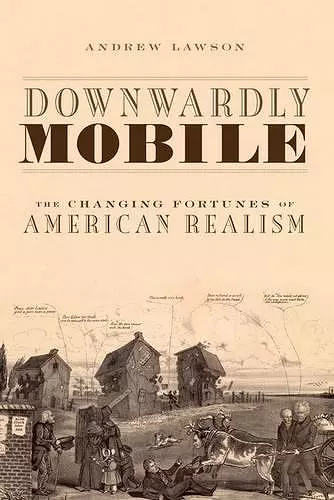Downwardly Mobile
The Changing Fortunes of American Realism
Format:Paperback
Publisher:Oxford University Press Inc
Published:22nd May '14
Currently unavailable, and unfortunately no date known when it will be back
This paperback is available in another edition too:
- Hardback£87.00(9780199828050)

In the unstable economy of the nineteenth-century, few Americans could feel secure. Paper money made values less tangible, while a series of financial manias, panics, and depressions clouded everyday life with uncertainty and risk. In this groundbreaking study, Andrew Lawson traces the origins of American realism to a new structure of feeling: the desire of embattled and aspiring middle class for a more solid and durable reality. The story begins with New England authors Susan Warner and Rose Terry Cooke, whose gentry-class families became insolvent in the wake of the 1837 Panic, and moves to the western frontier, where the early careers of Rebecca Harding Davis and William Dean Howells were shaped by a constant struggle for social position and financial security. We see how the pull of downward social mobility affected even the outwardly successful, bourgeois family of Henry James in New York, while the drought-stricken wheat fields of Iowa and South Dakota produced the most militant American realist, Hamlin Garland. For these writers, realism offered to stabilize an uncertain world by capturing it with a new sharpness and accuracy. It also revealed a new cast of social actors-factory workers, slaves, farm laborers, the disabled, and the homeless, all victims of an unregulated market. Combining economic history and literary analysis to powerful effect, Downwardly Mobile shows how the fluctuating fortunes of the American middle class forced the emergence of a new kind of literature, while posing difficult political choices about how the middle class might remedy its precarious condition.
Lawson's book is therefore not just another addition to the project of the New Economic Criticism, but in fact a significant rewriting of literary history. * Paul Crosthwaite, Peter Knight and Nicky Marsh, Years Work in Critical and Cultural Theory *
Downwardly Mobile is innovative in its approach, clearly and pleasingly written, and it will be of great interest not only to scholars of realism but, more generally, to those active in American literary and cultural studies. * Amy Schrager Lang, author of The Syntax of Class: Writing Inequality in Nineteenth-Century America *
Downwardly Mobile is a strikingly original and erudite study: a significant accomplishment. Lawson's work represents one of the best instances I've seen of an emerging formation of scholarship that combines a variety of intellectual commitments that used to be thought incompatible: careful historicism (including local storytelling and big-picture analyses), loving attention to writerly style, respect for a greatly expanded canon, and easy interweaving of several strands of critical theory (Marxism/materialism, psychoanalysis, queer theory) without any intrusive terminology or apparatus. * Nancy Glazener, author of Reading for Realism: The History of a U. S. Literary Institution, 1850-1910 *
Thoughtfully combines biography, economic history, and literary analysis to explore realism as a genre emerging from marketplace dislocations...Highly recommended. * Choice *
Lawson's book reminds us of the crucial and fundamental questions that must be asked whenever we talk about realism. * Review 19 *
[Lawson's] advanced argument is solidly supported, innovative, and valuable to those interested not only in American realism but in cultural materialism, history, and social and economic movements. * Studies in American Naturalism *
Just as realist writers clarified the real, Lawson clarifies why realism emerged when it did. Like the IMF and its flowchart, or the realist novels themselves, Lawson helps us trace something - the origins of literary realism - that would otherwise remain obscure. * The Journal of American Studies *
ISBN: 9780199375028
Dimensions: 155mm x 234mm x 15mm
Weight: 295g
208 pages